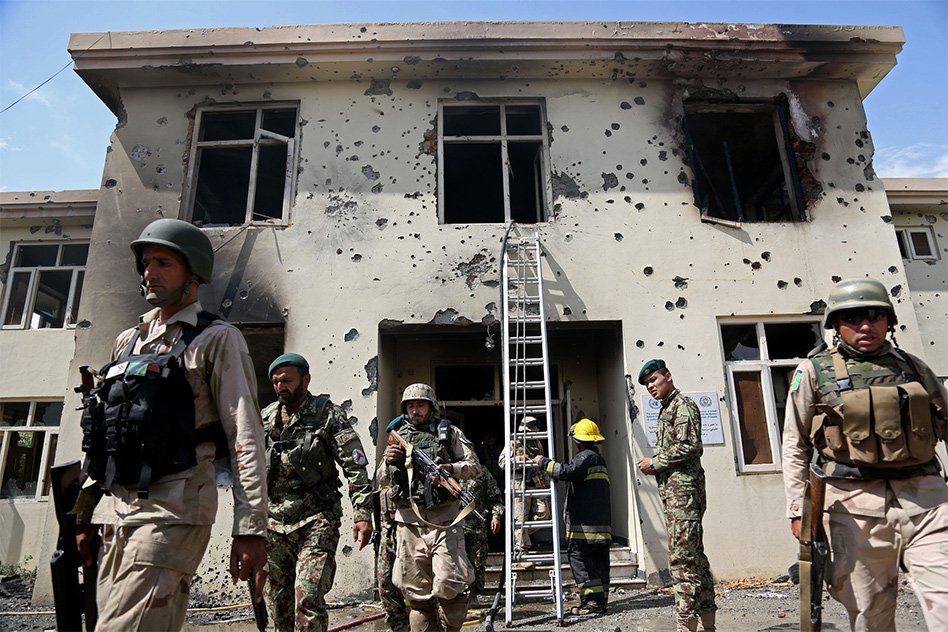
TLI's Weekly Wrap-up: 10 Important International News Stories Of The Week
17 April 2016 9:26 AM GMT
Editor : Sudhanva Shetty Shetty
Writer, coffee-addict, likes folk music & long walks in the rain. Firmly believes that there's nothing more important in a democracy than a well-informed electorate.
The week of 17 April, 2016.
John Kerry visits Hiroshima, Japan.
On 11 April, US Secretary of State John Kerry became the top-most American official to visit Hiroshima, a Japanese city which had been flattened by the atomic bomb dropped by the Allies towards to end of the Second World War. There have been reports that US President Barack Obama will issue a formal apology for the episode in the upcoming G7 summit – but the White House has not confirmed these speculations.
Dilma Rousseff faces impeachment, Brazil.
Following a Lower House committee’s recommendation on 12 April to impeach Brazilian President Dilma Rousseff, the House will vote on the issue on 17 April. Rousseff, hit by claims of financial mismanagement, government corruption and involvement in the Petrobras scandal, leads a weak coalition at the centre. The Sunday vote will decide her fate, even as she brands it a “coup”. The issue has sharply divided the citizens of the South American nation; its economy is failing as it battles high unemployment and its worst inflation in decades. On Sunday, if two-thirds of the Lower House votes in favour of impeachment, the Senate will have to vote next. If the Senate confirms the Lower House’s decision, Rousseff will be forced to step down for a Senate trial and her Vice President will take over.
Taliban begin spring offensive, Afghanistan.
The Taliban announced the start of their spring offensive on 12 April. The extremist groups have pledged to attack government strongholds to remove the Western-backed Afghan government. Only a few days earlier, the US Secretary of State John Kerry had visited Afghanistan to strengthen bilateral ties. The Taliban named their offensive “Operation Omari”, named after their founder Mullah Mohammad Omar. The Taliban insurgency began in 2001 after they were ousted by Western forces; at this point in 2016, they are stronger than they ever have been since 2001. The Taliban’s 2015 offensive claimed over 11,000 civilian lives – higher than any year on record according to the UN.
Earthquakes, World.
Japan’s Kyushu region was hit by twin earthquakes on 14 and 16 April measuring 6.2 and 7.0 on the Richter scale. At least 41 were killed and 1500 were injured by the devastating calamity. On 17 April, a 7.8 earthquake hit Ecuador, killing at least 77 people, with the death toll rising.
Race to elect next UN Secretary General begins, New York.
In a surprise move, the United Nations announced that this time the election of the Secretary General would be an open process, with candidates literally “auditioning” for the job of the world’s top diplomat. Thanks to a global campaign called ‘1 for 7 Billion’, this year’s nine candidates had to engage in public debate and answer questions from delegates and the public. The debates took place in New York from 14 April. The candidates are competing to succeed the current Secretary General, Ban Ki-moon, whose terms ends this year.
[http://time.com/4290706/united-nations-secretary-general-candidates/]
China’s first same-sex marriage case, China.
In the country’s first same-sex marriage case, a judge in China delivered a landmark ruling on 14 April. The judge ruled that a gay couple could not register as married. Activists, though saddened by the verdict, said this heralded the formal beginning of the struggle for LGBT equality in China.
New York primary, United States.
After suffering embarrassing defeats in recent primaries, Hillary Clinton and Donald Trump are facing escalating attacks over their status as frontrunners. The candidates increasingly look to the 19 April delegate-rich New York primary to cement their fortunes. Clinton and Bernie Sanders took part in a debate on 14 April in Brooklyn to pitch their ideas before the crucial 19 April vote.
Canadian government proposes to legalize assisted suicide, Canada.
The Canadian government introduced legislation on 14 April which proposes to legalize physician-assisted suicide for Canadians with serious medical conditions. Last year, the Supreme Court of Canada had ruled that it was unconstitutional to deny the option of assisted death to consenting adults who had “a grievous and irremediable medical condition” that has brought on “suffering that is intolerable”. The proposed law would be applicable only to Canadian nationals and not to tourists to dissuade “suicide tourism”.
Pope Francis adopts refugees, Vatican City.
On a visit to the Greek island of Lesbos on 16 April, Pope Francis took 12 Syrian refugees – including six children – back with him to be relocated in Italy. The Pope’s gesture was symbolic even as he toured the very core of Europe’s geopolitically-important refugee crisis begging for a sympathetic approach towards refugees.
[https://thelogicalindian.com/news/all-you-need-to-know-about-europes-tragic-refugee-crisis/]
Campaign for Britain’s EU referendum kicks off, United Kingdom.
15 April marked the beginning of the campaign of the British referendum on whether to or not to leave the European Union (EU). Several high-profile personalities including Prime Minister David Cameron and the Leader of Opposition Jeremy Corbyn have publicly warned against the implications of Britain leaving the EU. However, if polls are to be taken into account, the British people lean in favour of Brexit. Large swathes of voters are still undecided. The coming months will see aggressive campaigning from both sides and the result of the 23 June referendum is bound to adversely affect European politics as a whole.
 All section
All section













